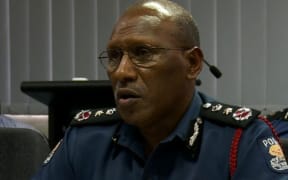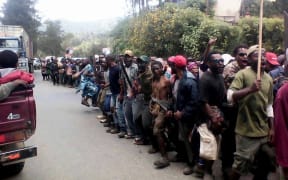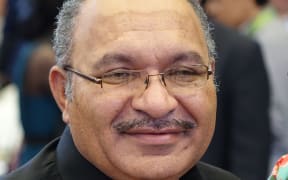A leading Papua New Guinea MP once said of the country's turbulent national politics that "there are no permanent friends and no permanent enemies".
That was exactly five years ago when freshly-elected MPs gathered following the general election to elect a new prime minister.
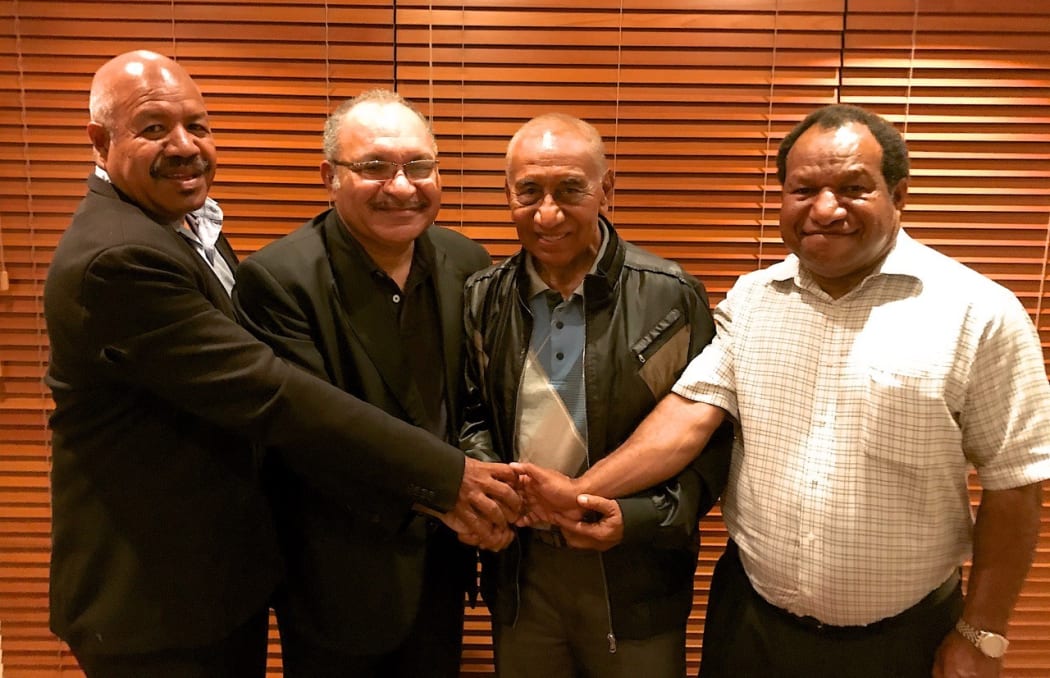
Bonding time: Powes Parkop (Leader of the Social Democratic Party), Peter O’Neill (Leader, of the People’s National Congress Party), Sir Julius Chan (of the People's Progress Party) and William Duma (Leader of the United Resources Party). Photo: Peter O'Neill Media Office
Now, the same MP - William Duma, the leader of the United Resources Party - finds himself and his group of several MPs in a very similar position at the same stage of the PNG parliamentary cycle.
He has shaken hands with the man he supported as prime minister for the past five years, Peter O'Neill, and purportedly committed to support him again for the top job.
But as Mr Duma cautioned last time around, the dynamics change all the time.
Fever pitch
Lobbying among newly elected MPs is reaching fever pitch in Papua New Guinea ahead of next week's scheduled sitting of parliament. The deadline for the return of writs in PNG's lengthy and troubled election is tomorrow, however results are yet to be declared in dozens of the 111 parliament seats.
The original deadline was last Monday but the electoral commissioner extended it for four days even though - with just hours remaining - dozens of seats are still to be declared. The Commissioner Patilias Gamato has yet to explain the apparent rush to have writs returned, when in previous elections the deadline has been extended for weeks.
But the leader of the People's National Congress party (PNC), Peter O'Neill, appears to be a man in a hurry to be prime minister again. He has issued a joint statement with leaders of smaller parties, the People's Progress Party, the United Resources Party (URP) and the Social Democrats Party announcing the formation of a coalition aiming to govern.
On their current track, these parties would still have less than the majority and would rely on independent MPs joining them for the scheduled vote for prime minister in parliament next week.
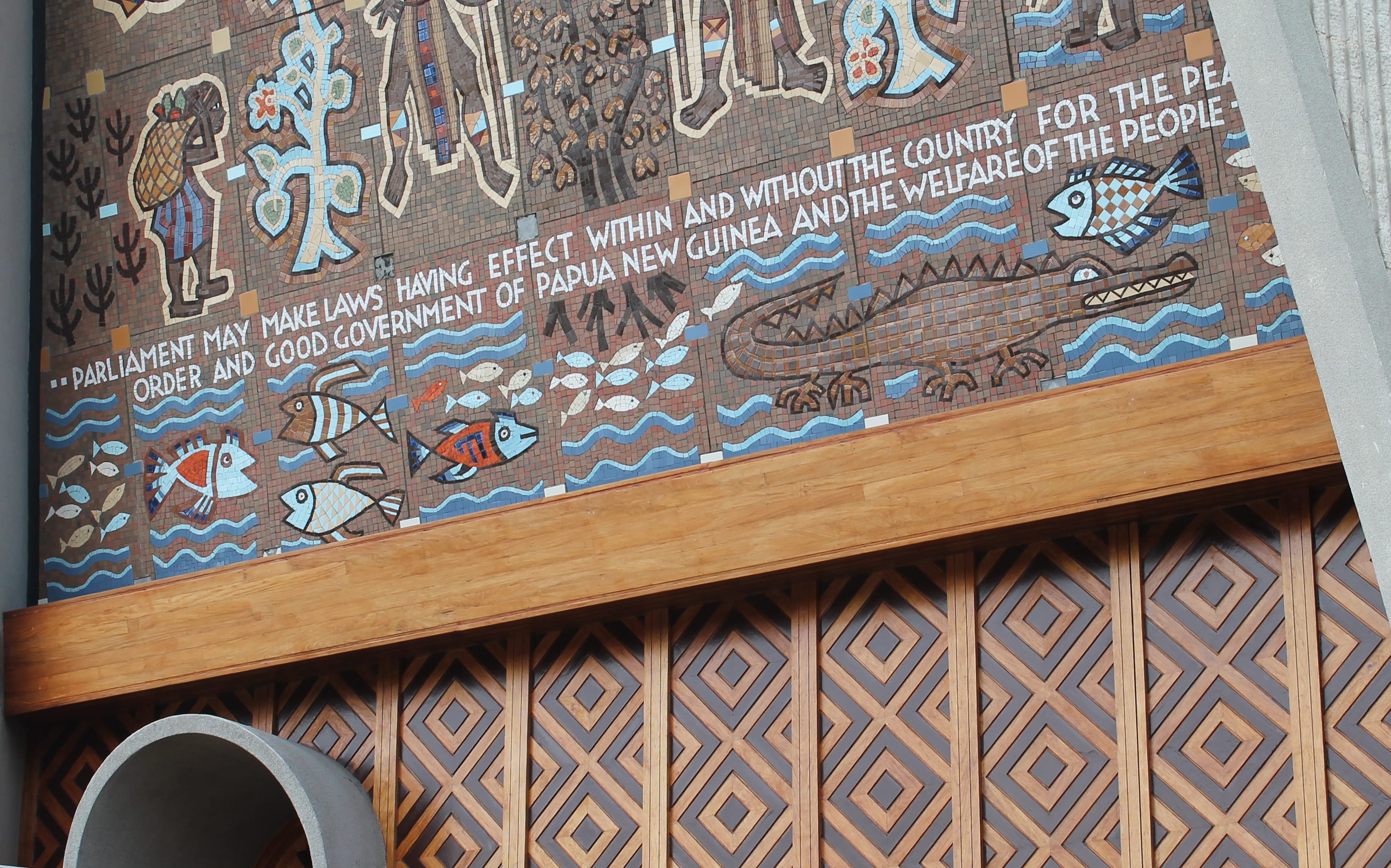
Papua New Guinea's parliament facade, after the removal of anthropomorphic carved heads from the front lintel. Photo: RNZ / Johnny Blades
One of the URP's new MPs-elect, Gazelle's Jelta Wong, admitted a lot of rumours were flying around at present, and even friends had cast aspersions on his new supposed political allegiances.
"I don't like to say everything is a done deal. You never know. People have their own minds," he said.
"All our electorates are all different When it comes down to the crunch, it's every member's decision, and we'll see which way everybody goes."
Wary of the mercenary edge to national politics which he is quickly learning about, Mr Wong said he just wanted to focus on helping his electorate.
The PNC meanwhile, has set up camp in Alotau where it has invited MPs-elect to join coalition talks. MPs from around the country find themselves being picked up by helicopter and flown in to the Milne Bay town for these talks or what some call the horse-trading over positions and portfolios. Talks are one thing, commitment is however another.
The joint statement from Mr O'Neill's office reassured the nation that the new coalition would "continue to empower our people through strong and dedicated Christian and State partnerships, and programs in education and healthcare".
But the Governor of Oro province, Gary Juffa, who was declared winner of his seat earlier this week, said the joint statement was a marketing strategy amid the lobbying of MPs.
"It's a marketing ploy basically to draw numbers, especially from the independents, to suggest that there is progress, that there is movement there and that that camp is the camp that will be moving into government," he explained.
"But the reality is that there are not that many people in Alotau. Even PNC members have not all flocked there. Some have refused to go. Some are under pressure from their own supporters who are basically demanding that they leave that camp or not go there at all."
Among the Social Democrats Party's three members is a first-time MP for the Central Bougainville seat.
Asked whether his constituents would agree with him being in a coalition with the PNC, Father Simon Dumarina said ultimately voters entrusted him to make the right decisions to advance Bougainville's interests.
"It's good to work from inside... from the inside out, so we can be more effective, rather than isolating myself out there, over there, it's good to be part of the team. Then we help each other in order to do something helpful for the people of Bougainville."
He said people of Bougainville would judge him in their own way, although it cannot have passed him by that the PNC-led government has let its commitments under the Bougainville Peace Agreement drift in recent years.
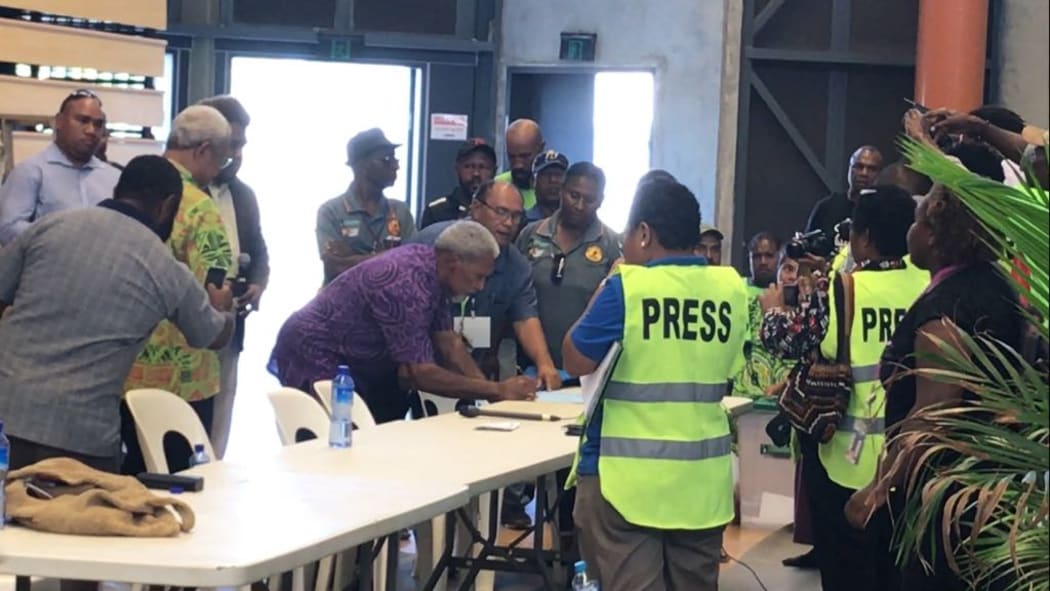
Sir Mekere Morauta signs the declaration of his election victory in the Moresby Northwest seat, 27 July 2017. Photo: Emmanuel Narokobi
Meanwhile, the former prime minister Sir Mekere Morauta has won the Moresby Northwest seat after a lengthy vote counting process full of delays. Sir Mekere retired from politics in the 2012 election but says he returned to the fray to help change the government of Peter O'Neill which he accuses of leading rhe country to economic ruin.
"I appeal to all independent members-elect to remain independent and join other independents to move strategically as a group," he said.
"Let the numbers in the political party landscape take shape, then move as a group to influence the making of a new government."
However Sir Mekere has been in talks with the main parties opposed to the PNC - the National Alliance, Pangu Pati and the PNG National Party - about the possibilities of forming a coalition.
The Pangu Pati, which is on track to have at least ten MPs, has set up a camp for discussions in Goroka. The National Alliance, which could win as many as 15 seats, is reported to have set up a base in Kokopo. It's clear though that PNC's main opponents will have to work together to have a chance of ousting Peter O'Neill.
Mr O'Neill's PNC is likely to end up as the single party with the most MPs with around 26 MPs. But even if its new alleged coalition with the three smaller parties holds tight, it will have its work cut out for it to gain a majority.
Election chaos lingers
The new parliament is scheduled to convene next Friday. Yet with vote counting still delayed and bogged down in disputes in various electorates, it's likely a number of seats will not have results declared by the time parliament sits.
"Is that deliberate or not? What happens then?" asked Gary Juffa. "It's the type of chaos that has never occurred in the past, a reflection of the most terribly managed election in the history of Papua New Guinea."
The election has been replete with many suspicious flaws in both the electoral roll and distribution of ballot papers.
If it proceeds without a number of MPs present, next week's parliamentary vote for prime minister could be in danger of lacking legitimacy. In the meantime, several areas of the Highlands are being terrorised by election-related violence.
Enga province's capital, Wabag, remains under lockdown after the weekend's deadly shootings, amid a dispute over the Kandep Open vote count left five people dead.
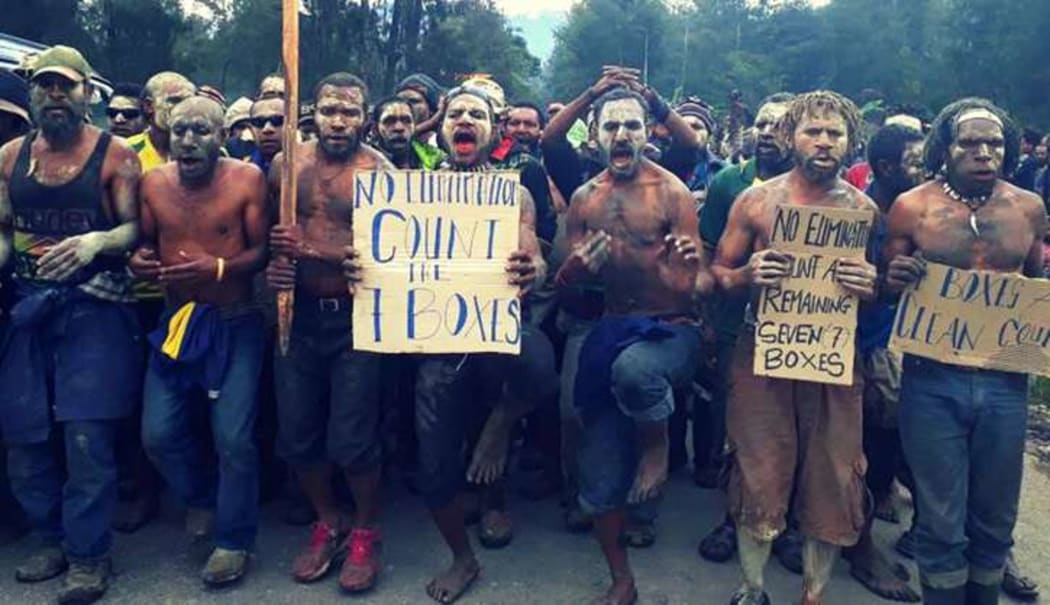
Protesting Engans urge the Electoral Commission to count all seats in the Kandep Open election. Photo: Supplied
In Western Highlands' capital, Mt Hagen, supporters of disgruntled candidates who believe their votes weren't counted in the local open seat are blockading the region's main airport.
And Southern Highlands province's capital, Mendi, has lapsed into violence and kidnappings over similar sets of grievances among candidates and their support bases.
The scramble to have a government formed when all these complex and explosive election issues remain unresolved could be opening the way for more problems.
